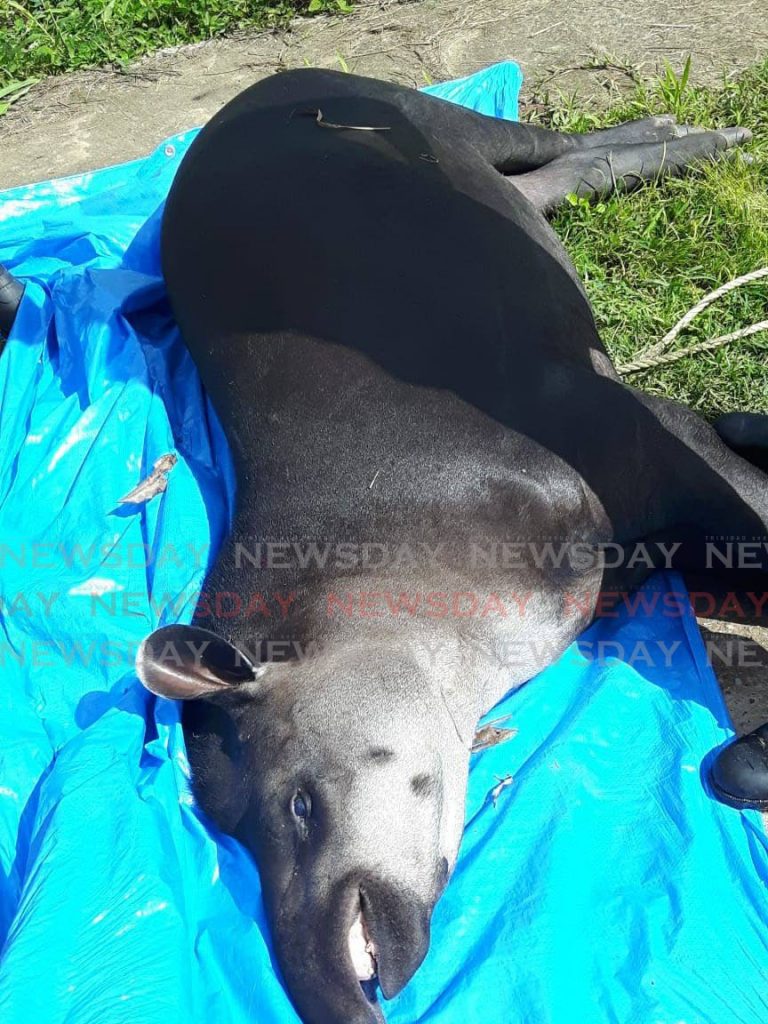Female tapir doing okay, loves bananas

PRESIDENT of the Zoological Society (ZSTT) Gupte Lutchmedial said the female tapir rescued from Penal was part of an increase in the trade of trafficked animals.
On Monday morning, residents reportedly awoke to see the animal roaming Ramjattan Trace, Penal. Frightened villagers called the Agriculture and Forestry Division, and game wardens, police and staff from the Emperor Valley Zoo started searching for the tapir.
She was found in nearby bush and was put to sleep with a tranquilliser, then taken to the zoo.
Lutchmedial, in a phone interview on Wednesday, said the tapir was doing “okay.” He said the drug used to tranquillise her was one that could be reversed as soon as the animal reached the zoo. The tapir ate normally, was “de-stressed” and put in a quarantine area, but close to asimilar animal that was also female.
“It would feel comfortable seeing another female,” said Lutchmedial.
He said the animal had some little bruises from the forest but they were minor.
The tapir was fed ten pounds of bananas, its favourite food.
Lutchmedial reported that it was domesticated and from the zoo’s information had been brought into the country when it was the size of dog and kept as a pet for years.
He explained that tapirs are trafficked mainly to be kept as pets and are friendly animals, only attacking if they have young.
He recalled seeing tapirs in the wild in Guyana and Colombia, and also some people keeping them like big dogs in their yards. There are two types of tapirs, mountain and wetlands. The tapir found is a wetlands tapir.
She was said to weigh 500 pounds, but Lutchmedial said she had not yet been weighed, and was probably closer to 400, and from the teeth was an adult and about four years old. He said a stool test was taken to check for any stomach diseases and it would be weighed after it was more settled.
He reported that in the last five years the zoo has received four tapirs, which cannot be returned to the wild.
“Once it has been kept as a pet, it will go back to human development.”
The tapir was currently under quarantine conditions. Lutchmedial said his main issue with the trafficking of animals is the diseases spreading from country to country, which would interfere with local animals.
“It is illegal to do. But if the animal is here, what do we do? The animal didn’t ask to come here.”
He said the main emphasis was to give animals some type of home and certain animals, if they clear all tests, would be released.
“Every day we go out and rescue an animal and rehabilitate it. It is nothing we advertise.”
Lutchmedial said he has been seeing an increase in trafficked animals, likely because of the desperation of South American people, who were bringing in things people wanted to buy. He added that man has always kept animals in captivity and many Trinidadians grew up with animals.
“People want to have a unique animal.”
Lutchmedial said he cannot be vex with people who want to keep animals, but there are legal requirements they have to go through.
Agriculture Minister Clarence Rambharat said the tapir was the second retrieved in the last six months and was part of the illegal trade from Venezuela. He said people have been bringing in animals through Icacos or Moruga, and sometimes, when the people expected to collect the animal do not show up or are no longer interested, it would be released right there. He said alternatively the animal may be kept as a pet and as it grows older starts consuming more food, and the owners abandon it.
He said people like to have exotic pets and last year two jaguars were rescued, which is one of the most dangerous animals you could have. He recalled the second jaguar was extremely healthy, well-fed, most likely exercised and appeared to have received care from a vet. He said he could only imagine the type of facility the jaguar was kept in.
“We keep telling people it is dangerous thing to do.”
The fine for having a protected animal without a permit is $5,000.

Comments
"Female tapir doing okay, loves bananas"